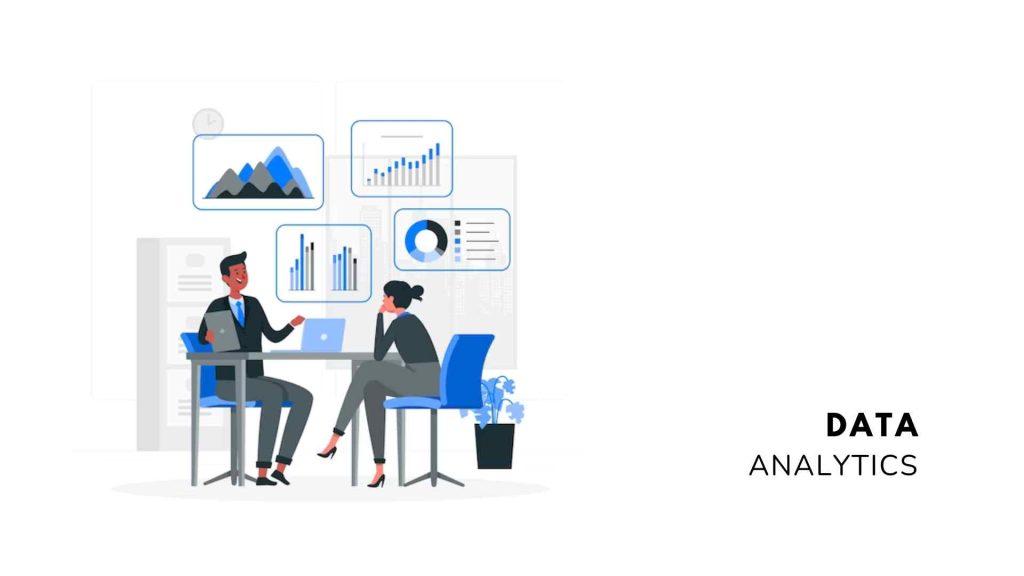In today’s data-driven world, businesses have access to vast information. However, it’s not just about having data; it’s about making sense of it and using it effectively. This is where data analytics comes into play. Data analytics is the key to changing raw data into useful insights that drive informed decision-making. We will examine data analytics’ pivotal role in business decision-making and why it’s a game-changer for organizations of all sizes.
Understanding Data Analytics
Data analytics examines, cleans, transforms, and interprets data to discover useful information, draw conclusions, and support decision-making. It involves different methods and tools, including statistical analysis, data mining, and predictive modeling.
Data-Driven Decision-Making
In the past, business decisions were often made based on intuition or limited data. However, the availability of big data and advanced analysis tools has revolutionized decision-making. Data-driven decision-making involves using historical and real-time data to inform and validate business strategies. Businesses can gain priceless insights into customer behavior, market trends, and operational efficiencies by examining data.
Improved Customer Insights
One of the most significant benefits of data analysis is its ability to provide deeper insights into customer behavior. Businesses can segment their customer base by analyzing customer data, understand purchasing patterns, and tailor marketing efforts accordingly. This results in more personalized customer experiences and higher customer satisfaction.
Operational Efficiency
Data analytics can also optimize internal processes and improve operational efficiency. By analyzing data on supply chain, production, and inventory, organizations can make adjustments to reduce costs and enhance productivity. Predictive analytics can help prevent equipment failures and downtime, saving time and money.
Market and Competitive Analysis
Staying competitive in today’s fast-paced business environment requires a profound understanding of market movements and the competition. Data analysis can help businesses monitor market changes, identify emerging trends, and benchmark themselves against competitors. This insight is invaluable in making strategic decisions and adapting to market shifts.
Risk Management
Effective risk management is essential for businesses. Data analysis can assist in recognizing possible risks and provide insights into strategies for mitigating them. Organizations can make more informed decisions regarding investments, insurance, and financial planning by analyzing historical data and using predictive modeling.
Personalized Marketing
Data analytics empowers businesses to create highly personalized marketing campaigns. By analyzing customer data, companies can target specific audiences with tailored messages and offers, resulting in higher conversion rates and improved ROI on marketing efforts.
Financial Planning and Forecasting
Data analytics plays a crucial role in financial planning and forecasting. Businesses can make informed decisions about budgeting, investments, and revenue projections by analyzing financial data and economic indicators. It is particularly important for long-term strategic planning.
In today’s business landscape, data analysis is not just a luxury; it’s a necessity. The ability to turn data into actionable insights is a game-changer for organizations looking to make informed decisions, improve customer experiences, optimize operations, and stay ahead of the competition.
By harnessing the strength of data analytics, companies can push success and growth in an increasingly data-centric world. So, if you haven’t already, it’s time to embrace data analytics as a fundamental tool for your business decision-making process.
How Acumatica Cloud ERP Can Enhance?
Acumatica Cloud ERP and Data Analytics form a dynamic duo that empowers organizations to harness the immense power of data for informed decision-making. ERP systems streamline business operations, ensuring data accuracy and accessibility, while data analysis tools provide the means to extract valuable insights from this data.
By integrating these technologies, organizations can achieve unprecedented efficiency, competitiveness, and agility in a data-driven world. With the ability to make timely, data-informed decisions, they are sufficiently placed to adjust to varying market conditions, seize opportunities, and mitigate risks.
In this era of data-driven decision-making, embracing ERP and data analytics is not just a choice; it’s a strategic imperative for businesses striving to thrive and excel in a rapidly evolving global landscape. Contact us for a Customized ERP.

Vijay comes with a vast experience in ERP and enterprise solutions space with about 20 years of experience in various packaged application like Acumatica, SAP, Orion, Salesforce.com, SugarCRM and, SalesLogix.

